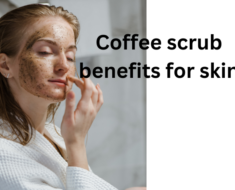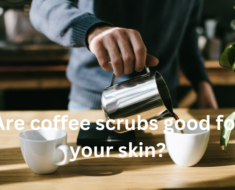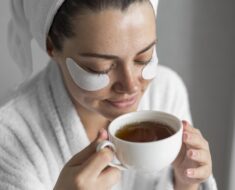Are you savoring that morning cup of coffee while worrying about its impact on your skin? Let’s delve into the buzz around whether drinking coffee spells trouble for your skin health.
In short, moderate coffee consumption isn’t detrimental to your skin.
Research suggests that its antioxidant properties can even offer some protective benefits against certain skin conditions.
Is decade coffee bad for your skin?
Curious to explore the nuances and expert insights into coffee’s effects on your skin? Join us as we uncover the science-backed truths and dispel myths about this beloved beverage’s impact on your skin’s well-being
Is drinking coffee bad for your skin?
Drinking coffee in moderation is generally not bad for your skin and may even offer some benefits.

Coffee is rich in antioxidants, such as chlorogenic acid and melanoidins, which can help protect your skin cells from damage caused by free radicals, thus potentially reducing the risk of premature aging and skin cancer.
Additionally, caffeine, when applied topically, has been found to constrict blood vessels, reducing redness and inflammation, which can be beneficial for conditions like rosacea and puffy eyes.
However, excessive consumption of coffee can lead to dehydration, which may contribute to dryness and dullness in the skin.
Moreover, if you tend to load your coffee with sugar and cream, it can lead to glycation, a process that accelerates aging by damaging collagen and elastin fibers.
In summary, moderate coffee consumption, preferably without excessive sugar and cream, is unlikely to harm your skin and may even provide some antioxidant benefits.
Here, coffee bad for skin?
However, maintaining overall hydration and a balanced diet are crucial for healthy skin.
Is drinking too much coffee bad for your skin?
Yes, drinking too much coffee can potentially have negative effects on your skin.
Excessive coffee consumption can lead to dehydration due to its diuretic effect, which can cause skin dryness, flakiness, and a lack of elasticity. Dehydration can also accentuate fine lines and wrinkles, making the skin appear aged.
Moreover, if you often consume coffee with added sugar, syrups, or creamers, it can lead to increased insulin levels and inflammation in the body.
This inflammation can manifest on the skin as acne, redness, or irritation.
Additionally, the caffeine in coffee can disrupt sleep patterns if consumed in large amounts, leading to insufficient rest and contributing to dull, tired-looking skin.
To maintain healthy skin while enjoying coffee, it’s essential to drink it in moderation, stay hydrated by drinking plenty of water throughout the day, and opt for healthier coffee additions like almond milk or cinnamon instead of sugar-laden options.
DOES COFFEE CAUSE ACNE?
Coffee itself is not a direct cause of acne. However, certain aspects related to coffee consumption can potentially contribute to acne development in some individuals.
For instance, the high caffeine content in coffee can stimulate the production of stress hormones like cortisol, which may trigger an increase in oil production in the skin.
Excess oil, combined with dead skin cells and bacteria, can clog pores and lead to acne breakouts.
Furthermore, if you consume your coffee with added sugars, syrups, or dairy products, these ingredients can contribute to increased insulin levels and inflammation in the body, both of which are associated with acne.
However, it’s essential to note that the relationship between coffee and acne can vary significantly from person to person.
Here, coffee ground good for skin?
Some individuals may notice that their acne worsens with increased coffee consumption, while others may not experience any noticeable effects.
Overall, maintaining a balanced diet, proper skincare routine, and staying hydrated are key factors in managing acne-prone skin.
How Your Morning Coffee Damages Your Skin
Your morning coffee can potentially damage your skin in several ways. Firstly, coffee is a diuretic, meaning it can lead to dehydration if consumed in excess.
Dehydrated skin lacks moisture, leading to dryness, flakiness, and a dull complexion.
Chronic dehydration can also impair the skin’s ability to repair itself and maintain elasticity, contributing to premature aging signs like fine lines and wrinkles.
Moreover, coffee can stimulate the production of stress hormones like cortisol due to its caffeine content.
Elevated cortisol levels can increase oil production in the skin, leading to clogged pores and acne breakouts.
Additionally, suppose you tend to drink your coffee with added sugars, syrups, or creamers. In that case, these ingredients can contribute to glycation, a process that damages collagen and elastin fibers, accelerating the aging process and causing sagging skin.
To minimize these potential negative effects, it’s crucial to consume coffee in moderation, stay hydrated with water, and choose healthier coffee options without excessive additives.
Expert Opinions on Coffee and Skin
1. Dr. Jessica Wu’s Perspective
Dr. Jessica Wu, a renowned dermatologist based in Los Angeles, emphasizes the importance of utilizing coffee’s antioxidant properties through topical applications rather than consumption.

She notes that caffeine’s diuretic effects can lead to dehydration, impacting both overall health and skin vitality.
Dr. Wu advises maintaining hydration levels by consuming one cup of water for every cup of coffee or caffeinated beverage.
2. Mila Moursi’s Insights
Mila Moursi, a respected facialist, acknowledges the mixed opinions surrounding coffee but highlights its nutritional benefits and antioxidant richness.
She suggests moderation for individuals sensitive to caffeine’s stimulating effects and recommends exploring alternatives like coffee enemas for those seeking unique benefits.
3. Jillian Wright’s Cautionary Notes
Jillian Wright, an experienced aesthetician, raises concerns about coffee’s potential impact on cortisol levels and skin complexion.
She advocates for mindful coffee consumption, particularly opting for fair trade and organic varieties to minimize toxin exposure and support overall skin health.
4. Ada Ooi’s Comprehensive View
Ada Ooi, a skin and wellness expert, delves into the complex relationship between coffee, cellulite, and hormonal balance.
Here, how does green coffee bean work for weight loss?
She emphasizes the need for balance and moderation in coffee consumption to avoid adverse effects on skin appearance and systemic health.
5. Angela Caglia’s Recommendations
Angela Caglia, a seasoned aesthetician, warns against excessive coffee consumption due to its potential to elevate stress hormones and accelerate aging processes.
She suggests exploring alternatives like Mud Water for a balanced and skin-friendly beverage choice.
6. Mimi Luzon’s Stress-Related Insights
Mimi Luzon, a respected facialist, highlights the role of stress induced by coffee consumption in skin health.
She encourages considering topical caffeine products for skin benefits while being mindful of stress-related impacts on skin conditions.
7. Dr. Harold Lancer’s Advice
Dr. Harold Lancer, a renowned dermatologist, advises moderation in coffee intake to mitigate potential hormonal disruptions and skin-related issues such as acne.
He recommends opting for high-quality coffee and avoiding excessive additives that may affect gut health and skin inflammation.
8. Dr. Bruce Katz’s Clarifications
Dr. Bruce Katz, a board-certified dermatologist, dispels myths regarding coffee’s direct impact on cellulite and acne, focusing instead on stress-related factors that can exacerbate skin conditions.
He emphasizes the importance of managing stress levels for overall skin health.
9. Natalie Aguilar’s Hydration Insights
Natalie Aguilar, a dermatological nurse, stresses the significance of hydration in counteracting potential skin damage from sugary coffee drinks.
She advises moderation and highlights the benefits of plain coffee’s anti-inflammatory and antioxidant properties for skin health.
Components of Coffee and Their Effects on Skin
1. Caffeine
Caffeine is a central nervous system stimulant found abundantly in coffee. When consumed moderately, caffeine can improve blood circulation, potentially benefiting the skin by reducing puffiness and improving overall skin tone.
2. Antioxidants
Coffee is rich in antioxidants, such as polyphenols, which can help combat free radicals and protect the skin from oxidative stress. These antioxidants may contribute to a healthier complexion and a reduced risk of premature aging.
Here, why is black coffee good for weight loss?
Potential Benefits of Coffee for Skin
1. Anti-Inflammatory Properties
Some studies suggest that coffee’s anti-inflammatory properties can help alleviate skin conditions like acne and eczema. The antioxidants in coffee may also soothe irritated skin and promote faster healing.
2. Anti-Aging Effects
The antioxidants in coffee can neutralize free radicals, which are known to accelerate aging processes. Regular consumption of coffee, in moderation, may contribute to firmer, more youthful-looking skin.
Negative Effects of Excessive Coffee Consumption on Skin
1. Dehydration
Coffee is a diuretic, meaning it can increase urine production and lead to dehydration if consumed excessively. Dehydrated skin can appear dull, dry, and prone to fine lines and wrinkles.
2. Insomnia and Stress-Related Skin Issues
Excessive caffeine intake, especially close to bedtime, can disrupt sleep patterns, leading to tired-looking skin and exacerbating stress-related skin conditions like eczema and psoriasis.
Moderation and Balance in Coffee Consumption for Skin Health
While coffee offers potential benefits for the skin, moderation is key. Limiting your daily caffeine intake and staying adequately hydrated can help mitigate any negative effects on your skin’s health.
Tips for Maintaining Healthy Skin While Enjoying Coffee
- Drink plenty of water throughout the day to counteract coffee’s diuretic effects.
- Opt for organic, freshly brewed coffee to maximize antioxidant benefits.
- Use a moisturizer with SPF to protect your skin from sun damage, especially if you consume coffee outdoors.
- Practice a consistent skincare routine that includes cleansing, exfoliating, and moisturizing to keep your skin healthy and radiant.
- Consider consulting a dermatologist if you experience persistent skin issues or are unsure about how coffee may be affecting your skin.
Here, how much coconut oil in coffee for weight loss?
FAQs about Coffee’s Impact on Skin
Does drinking coffee cause skin problems?
While moderate coffee consumption is generally safe, excessive intake can potentially lead to skin issues.
High caffeine consumption may dehydrate the skin, leading to dryness and exacerbating conditions like eczema or psoriasis. Additionally, the heat from hot coffee can dilate blood vessels, potentially worsening rosacea.
However, individual reactions vary, and some people may not experience these effects. Maintaining hydration and moderation in coffee consumption can help mitigate these potential skin problems.
How much coffee is bad for your skin?
The amount of coffee that can be considered “bad” for your skin varies among individuals.
Generally, excessive caffeine intake, typically exceeding 3-4 cups per day, can dehydrate the skin, leading to dryness, inflammation, and potential aggravation of skin conditions like eczema or acne.
It’s essential to balance coffee consumption with adequate hydration and a healthy skincare routine to minimize any negative impact on the skin.
Is quitting coffee good for your skin?
Quitting coffee can have positive effects on skin health for some individuals. Caffeine can dehydrate the skin, leading to dryness and potential aggravation of skin conditions.
Quitting coffee may help improve skin hydration and reduce inflammation, resulting in a clearer complexion.
However, individual responses vary, and other factors like overall diet and skincare habits also play crucial roles in skin health.
Consulting with a healthcare professional can provide personalized guidance on the benefits of quitting coffee for skin improvement
Is coffee bad for skin aging?
Coffee contains antioxidants that can be beneficial for skin health and may even have anti-aging properties.
However, excessive coffee consumption can dehydrate the skin, leading to premature aging signs like fine lines and wrinkles.
Additionally, the caffeine in coffee can potentially disrupt sleep patterns, which may indirectly contribute to skin aging.
Moderation is key; consuming coffee in moderation and maintaining a healthy lifestyle can help mitigate any negative effects on skin aging.
Can coffee cause acne?
While individual responses may vary, excessive coffee consumption can potentially aggravate acne in some people due to its stimulant effects.
Does drinking decaffeinated coffee have the same skin benefits?
Decaffeinated coffee retains some antioxidants but lacks caffeine, so its impact on skin health may differ from regular coffee.
How much coffee is considered moderate for skin health?
Consuming 1-2 cups of coffee per day is generally considered moderate and unlikely to have significant negative effects on skin health.
Can topical coffee products improve skin appearance?
Some skincare products contain coffee extracts for their antioxidant properties, which may contribute to healthier-looking skin when used alongside a comprehensive skincare routine.
Are there any specific skincare concerns for coffee lovers?
Coffee lovers should pay attention to hydration levels and monitor their caffeine intake to prevent dehydration and potential skin issues.
Conclusion
In conclusion, moderate coffee consumption can offer several potential benefits for your skin, thanks to its antioxidant properties and ability to improve blood circulation.
However, excessive coffee intake can lead to dehydration and exacerbate stress-related skin conditions.
Maintaining a balanced approach to coffee consumption and prioritizing overall skin health is essential for reaping the most benefits.






